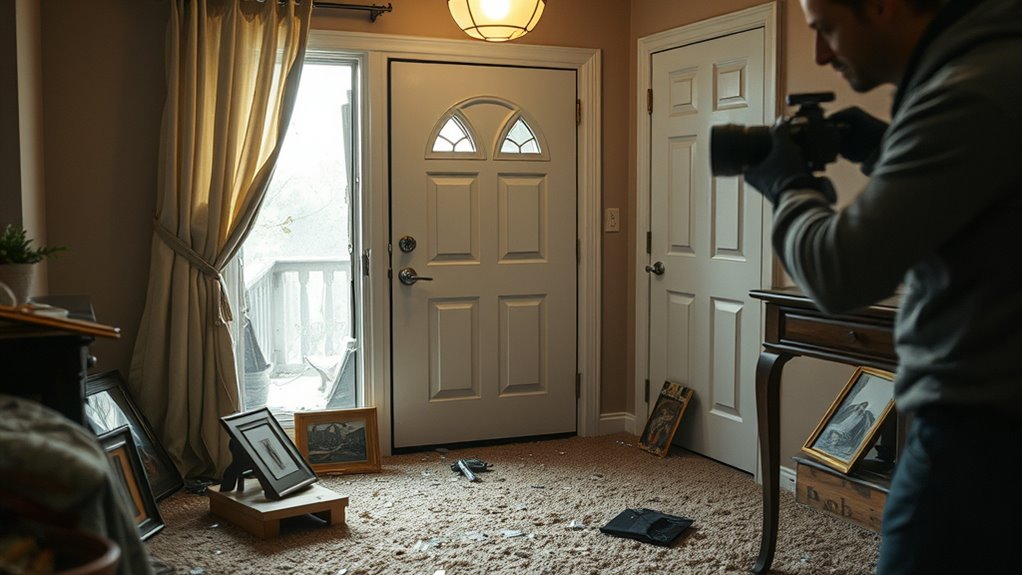After a home break-in, your first step is to stay calm and make certain everyone’s safety. Do not touch or move anything inside the house to preserve evidence. Exit safely if you can, then call the police to report the incident. When authorities arrive, cooperate fully and avoid rummaging through belongings. Take photos of any damage or suspicious clues from a safe distance, and consider installing security measures. For detailed steps on handling this situation, keep exploring how to respond effectively.
Key Takeaways
- Ensure everyone’s safety and exit the home if necessary, avoiding disturbance of potential evidence.
- Call police immediately to report the break-in and wait for their arrival.
- Document damage and suspicious activity with photos from a safe distance.
- Do not touch or move anything inside the home to preserve evidence for investigation.
- Notify your insurance company, list stolen items, and consider security upgrades afterward.

Discovering that your home has been broken into can be a shocking experience. Your heart races, and you might feel a surge of fear or confusion. In this moment, it’s vital to stay calm and act swiftly. First, avoid the temptation to touch or move anything inside your home. Intruders often leave behind evidence, and disturbing these clues could jeopardize an investigation later on. Your immediate priority should be safety—your safety and that of anyone else in the house.
Discover your home has been broken into? Stay calm, prioritize safety, and avoid disturbing evidence for effective investigation.
Once you’re safely outside or in a secure location, call the police right away. Reporting the break-in is essential, even if nothing appears to be stolen. The authorities need to document the incident and collect evidence. When speaking with the police, provide a detailed account of what you observed, along with any suspicious activity you noticed beforehand. If you haven’t already, pull out your emergency contact list so you can inform trusted friends, family members, or neighbors to keep an eye out for further suspicious behavior and to support you during this stressful time.
While waiting for the police to arrive, think about whether your home is secure enough to re-enter. If you must go inside, do so cautiously. Check for signs of forced entry, such as broken locks or shattered windows, but don’t go looking through your belongings yourself. Instead, document the damage with photos from a safe distance, which can be helpful for insurance claims later. This is also a good time to review your security measures. If you don’t already have security camera installation in place, now is the perfect opportunity to consider it. Cameras can provide valuable footage that helps identify intruders and prevent future incidents.
After the police leave, contact your insurance company to report the theft and damage. Make a detailed list of stolen items, including approximate values, and provide any supporting photos or documentation. This step is vital for processing your claim efficiently. Additionally, take steps to improve your home security—install security cameras if you haven’t already, upgrade locks, and reinforce entry points. These actions can reduce the risk of another break-in.
Finally, review and update your emergency contact list. Ensure it includes local law enforcement, trusted neighbors, and family members who can assist you in emergencies. Keep this list in a visible, accessible place so you’re prepared if something like this happens again. Remember, your safety and peace of mind depend on your quick, measured response and the steps you take immediately after the break-in.
It’s also a good idea to familiarize yourself with retail operating hours for stores near you, so you know where to quickly seek supplies or assistance if needed in future emergencies.
Frequently Asked Questions
How Can I Prevent Future Break-Ins Effectively?
You can prevent future break-ins by installing security cameras to monitor your property and deter intruders. Make sure to use outdoor lighting around entry points and dark corners, which discourages criminals from approaching. Keep doors and windows locked, reinforce weak spots, and consider a security system for added protection. Regularly update your security measures and stay vigilant to make your home less appealing to potential intruders.
Should I Change My Locks After a Break-In?
Certainly, changing your locks is a smart step after a break-in. Lock replacement not only restores security but also signals a fresh start. Consider security upgrades like sturdy deadbolts or smart locks to bolster your defenses. Don’t delay—deliberately decide on durable, dependable devices that deter thieves and deliver peace of mind. Taking proactive, practical precautions can prevent future break-ins and protect your home and loved ones effectively.
Is It Safe to Stay Inside the House After a Break-In?
It’s generally safe to stay inside your house after a break-in if you’ve completed a thorough security assessment and guaranteed all entry points are secure. However, prioritize your emotional support and don’t hesitate to leave if you feel unsafe. Contact authorities if you haven’t already, and consider staying with a trusted friend or family member until you’re confident your home is secure. Your safety and well-being come first.
What Should I Do if I Suspect the Burglar Is Still Inside?
If you suspect the burglar is still inside, stay as silent as a shadow and avoid confrontation. Call 911 immediately, and activate your home security system’s tamper alerts if available. Do not attempt to search the house yourself, as this could be dangerous. Your priority is to remain safe and let law enforcement handle the situation, ensuring your home security is reinforced once the threat is neutralized.
How Do I Deal With Neighbors’ Concerns After a Break-In?
You should address your neighbors’ concerns by openly communicating and reassuring them. Share details about the incident to foster community support, and listen to their worries. Keep everyone informed about any safety measures you’re taking, like installing security cameras or changing locks. Encouraging neighbor communication helps strengthen community bonds, making everyone feel safer and more connected, which can deter future break-ins and promote a supportive environment during this stressful time.
Conclusion
After ensuring everyone’s safety and calling the police, take a moment to breathe. Imagine the quiet, heavy stillness settling over your home, the broken window glinting under the harsh porch light. Though your heart races, remember that each step you take now helps restore your sense of security. Stay vigilant, document everything, and lean on support. Soon, this dark chapter will fade, replaced by the strength it takes to rebuild and reclaim your space.








